David Hume was a Scottish philosopher, economist, and historian. He is an important figure in Western philosophy, and in the history of the Scottish Enlightenment. Hume first gained recognition and respect as a historian, but academic interest in Hume's work has in recent years centered on his philosophical writing. His "History of England" was the standard work on English history for many years, until Macaulay's "The History of England from the Accession of James the Second". Hume was the first philosopher of the modern era to produce a naturalistic philosophy. This philosophy partly consisted in rejection of the historically prevalent conception of human minds as being miniature versions of the divine mind. This doctrine was associated with a trust in the powers of human reason and insight into reality, which possessed God's certification. Hume's scepticism came in his rejection of this 'insight ideal', and the (usually rationalistic) confidence derived from it that the world is as we represent it. Instead, the best we can do is to apply the strongest explanatory and empirical principles available to the investigation of human mental phenomena, issuing in a quasi-Newtonian project, Hume's 'Science of Man'. Hume was heavily influenced by empiricists John Locke and George Berkeley, along with various French-speaking writers such as Pierre Bayle, and various figures on the English-speaking intellectual landscape such as Isaac Newton, Samuel Clarke, Francis Hutcheson, and Joseph Butler.

The History of England Volume 5 : James I and Charles I
David Hume
audiobook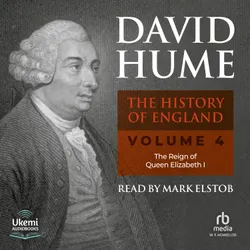
The History of England Volume 4 : The Reign of Queen Elizabeth I
David Hume
audiobook
The History of England Volume 3 : From Henry VII to Mary
David Hume
audiobook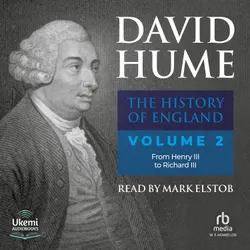
The History of England Volume 2 : King Henry III to King Richard III
David Hume
audiobook
The History of England Volume 1 : From the Invasion of Julius Caesar to King John
David Hume
audiobook
An Enquiry Concerning the Principles of Morals and Other Works
David Hume
audiobook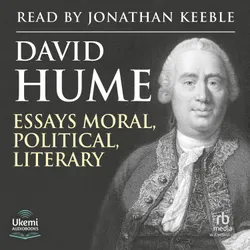
Essays, Moral, Political, and Literary
David Hume
audiobook
50 Meisterwerke der Philosophie : Metaphysik, Das Gastmahl, Bhagavadgita, Tractatus logico-philosophicus, Kritik der reinen Vernunft, Also sprach Zarathustra, Selbstbetrachtungen von Marcus Aurelius
Ludwig Wittgenstein, Edmund Husserl, Karl Marx, Søren Kierkegaard, Friedrich Nietzsche, Ralph Waldo Emerson, John Stuart Mill, Georg Wilhelm Friedrich Hegel, Friedrich Schelling, Johann Gottlieb Fichte, Immanuel Kant, John Locke, Montesquieu, Jean Jacques Rousseau, David Hume, Gottfried Wilhelm Leibniz, Baruch Spinoza, Konfuzius, Laotse, Platon, Xenophon, Aristoteles, Marcus Tullius Cicero, Seneca, Epiktet, Marc Aurel, Plotin, Thomas von Aquin, Nicolaus von Cues, Erasmus von Rotterdam, Niccolò Machiavelli, Tommaso Campanella, Martin Luther, Giordano Bruno, Samuel von Pufendorf, Abbé Castel de Saint-Pierre, Michel de Montaigne, René Descartes, Francis Bacon, Blaise Pascal
book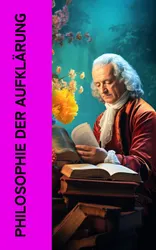
Philosophie der Aufklärung : Die wichtigsten Werke von Immanuel Kant, John Locke, Rousseau, Voltaire, Denis Diderot, David Hume, Leibniz, Johann Gottfried Herder
Johann Gottfried Herder, Montesquieu, David Hume, Denis Diderot, Jean-Jacques Rousseau, John Locke, Thomas Hobbes, Benjamin Franklin, Francis Bacon, Immanuel Kant, Baruch Spinoza, Isaac Newton, Freiherr Gottfried Wilhelm von Leibniz, Voltaire, René Descartes
book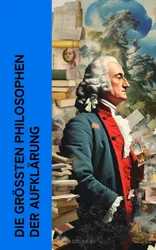
Die größten Philosophen der Aufklärung : Neues Organon, Kritik der reinen Vernunft, Der Gesellschaftsvertrag, Candide, Monadologie, Mathematische Principien der Naturlehre
Jean-Jacques Rousseau, Voltaire, Denis Diderot, David Hume, Johann Gottfried Herder, John Locke, Thomas Hobbes, Benjamin Franklin, Francis Bacon, Immanuel Kant, Montesquieu, Baruch Spinoza, Isaac Newton, Freiherr Gottfried Wilhelm von Leibniz, René Descartes
book
Eine Untersuchung über den menschlichen Verstand : Ein philosophisches Meisterwerk über die Natur des Denkens und der Wahrnehmung
David Hume
book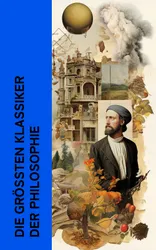
Die größten Klassiker der Philosophie : Also sprach Zarathustra, Utopia, Phänomenologie des Geistes, Neues Organon, Selbstbetrachtungen, Das Gastmahl, Nikomachische Ethik
Immanuel Kant, Søren Kierkegaard, Edmund Husserl, Ludwig Wittgenstein, Friedrich Nietzsche, Konfuzius, Platon, Xenophon, Aristoteles, Laotse, Marcus Tullius Cicero, Marcus Aurelius, Plotin, Thomas von Aquin, Niccolò Machiavelli, Thomas Morus, Giordano Bruno, Michel de Montaigne, René Descartes, Francis Bacon, Blaise Pascal, Baruch Spinoza, Gottfried Wilhelm Leibniz, David Hume, Jean Jacques Rousseau, Friedrich Schelling, John Locke, Georg Wilhelm Friedrich Hegel, John Stuart Mill, Karl Marx
book
